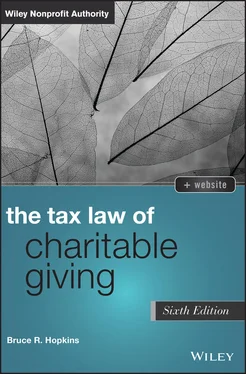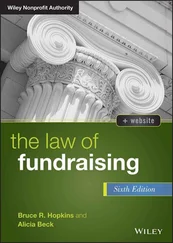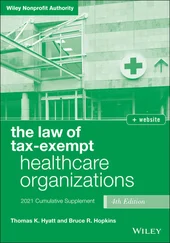Bruce R. Hopkins - The Tax Law of Charitable Giving
Здесь есть возможность читать онлайн «Bruce R. Hopkins - The Tax Law of Charitable Giving» — ознакомительный отрывок электронной книги совершенно бесплатно, а после прочтения отрывка купить полную версию. В некоторых случаях можно слушать аудио, скачать через торрент в формате fb2 и присутствует краткое содержание. Жанр: unrecognised, на английском языке. Описание произведения, (предисловие) а так же отзывы посетителей доступны на портале библиотеки ЛибКат.
- Название:The Tax Law of Charitable Giving
- Автор:
- Жанр:
- Год:неизвестен
- ISBN:нет данных
- Рейтинг книги:5 / 5. Голосов: 1
-
Избранное:Добавить в избранное
- Отзывы:
-
Ваша оценка:
- 100
- 1
- 2
- 3
- 4
- 5
The Tax Law of Charitable Giving: краткое содержание, описание и аннотация
Предлагаем к чтению аннотацию, описание, краткое содержание или предисловие (зависит от того, что написал сам автор книги «The Tax Law of Charitable Giving»). Если вы не нашли необходимую информацию о книге — напишите в комментариях, мы постараемся отыскать её.
The Tax Law of Charitable Giving — читать онлайн ознакомительный отрывок
Ниже представлен текст книги, разбитый по страницам. Система сохранения места последней прочитанной страницы, позволяет с удобством читать онлайн бесплатно книгу «The Tax Law of Charitable Giving», без необходимости каждый раз заново искать на чём Вы остановились. Поставьте закладку, и сможете в любой момент перейти на страницу, на которой закончили чтение.
Интервал:
Закладка:
A court denied a charitable contribution deduction for a transfer of real property ostensibly occurring in 1999 because the bill of sale executed on the last day of that year did not result in an irrevocable transfer to the charitable organization involved of legal title to the property because the sale document was not executed in accordance with state law. 64 A properly executed bill of sale was delivered to the charity in the subsequent year; that was the year in which the deduction was allowed.
A charitable contribution deduction for a transfer of mortgaged land to a charitable organization by a partnership was denied by a court because the property was subject to a special warranty deed. Under state law, the donor partnership remained liable on the outstanding mortgage. The deed imposed an obligation on the grantor to protect the grantee against adverse claims that might impair the grantee's title to the land. Thus, the court held that the warranty was merely a promise to make payments in the future, with a charitable deduction available when the payments were actually made. 65
§ 4.15 CONTRIBUTIONS OF EASEMENTS
As is the case with gifts of real property, 66 state law will determine the effective date of the contribution of an easement. 67 In one situation, a partnership purported to convey a conservation easement in 2004, claiming a $2.21 million charitable deduction. A court determined that, under state law, a conservation easement is effective only if it is duly recorded and indexed in the county where the land is situated. Consequently, because the easement transfer was not recorded until 2005, the court rejected the partnership's argument that the easement was contributed in 2004. 68
A court ruled that the gift of a facade easement to a qualified public charity, resulting in a claimed charitable deduction of $11.4 million, was not deductible because the charity was two years late in recording the deed of easement. 69 Under state law, the conservation easement did not have any legal effect until it was recorded. The court also held that this state of affairs violated the federal tax law requirement that the restricted gift be in perpetuity. 70
§ 4.16 CONTRIBUTIONS BY C CORPORATIONS
The foregoing rules apply with respect to gifts by both individual and corporate donors. Thus, the general rule that a federal income tax charitable contribution deduction arises at the time the contribution is made and for the year in which it is made is equally applicable to individual and corporate donors.
A C corporation 71 that reports its taxable income using the accrual method of accounting may, however, at its election, deduct charitable contributions paid within two and one-half months after the close of its tax year, as long as: (1) the board of directors of the corporation authorized the making of a charitable contribution during the tax year, and (2) the charitable contribution is made after the close of the tax year of the corporation and within the two-and-one-half-month period. 72
This election must be made at the time the return for the tax year is filed, by reporting the contribution on the return. There must be, attached to the return, a written declaration that the resolution authorizing the contribution was adopted by the board of directors during the tax year involved, and the declaration must be verified by a statement signed by an officer authorized to sign the return that it is made under penalties of perjury. A copy of the resolution of the board of directors authorizing the contribution must also be attached to the return. 73
To satisfy this rule, contributions of property need not be segregated by year and there is no requirement that the donees be identified at the time the resolution is adopted. 74
§ 4.17 CONTRIBUTIONS BY S CORPORATIONS
Deductions pursuant to the rules pertaining to C corporations 75 are not available to S corporations, 76 which are treated the same as partnerships for tax purposes. 77 (Each shareholder of an S corporation takes into account the shareholder's pro rata share of the corporation's items of income, loss, deduction, or credit. 78 ) Rather, an S corporation must report the charitable contribution on its tax return for the year in which the contribution was actually made. 79 This is because an S corporation generally computes its taxable income in the same manner as an individual. 80 Certain deductions are not allowable to an S corporation, including the charitable contribution deduction. 81
Under the law prior to its amendment in 2006, if an S corporation contributed money or other property to a charitable organization, each shareholder took into account the shareholder's pro rata share of the contribution in determining the shareholder's income tax liability. 82 A shareholder of an S corporation reduced the basis in the stock of the S corporation by the amount of the charitable contribution that flowed through to the shareholder. 83
Pursuant to the amended law, the amount of a shareholder's basis reduction in the stock of an S corporation, by reason of a charitable contribution made by the corporation, was equal to the shareholder's pro rata share of the adjusted basis of the contributed property. 84 This rule was applicable to contributions made in tax years beginning after December 31, 2005, and tax years beginning before January 1, 2015. 85 It has not been further extended.
§ 4.18 CONTRIBUTIONS BY PARTNERSHIPS
The taxable income of a partnership generally is computed in the same manner as for individuals; however, the charitable contribution deduction is not allowed to the partnership. 86 Rather, each partner takes into account separately the partner's distributive share of the partnership's charitable contributions. 87
A partner's distributive share of charitable contributions made by a partnership during a tax year of the partnership is allowed as a charitable deduction on the partner's tax return for the partner's tax year within which the tax year of the partnership ends. 88 The aggregate of the partner's share of partnership contributions and the partner's own (directly made) contributions are subject to the various percentage limitations on annual deductibility. 89
Moreover, when a partnership makes a charitable contribution of property, the basis of each partner's interest in the partnership is decreased (but not below zero) by the amount of the partner's share of the partnership's basis in the property contributed. 90
The adjusted basis of a partner's interest in a partnership must be increased by the sum of the partner's distributive share for the tax year and prior tax years of the taxable income of the partnership, the income of the partnership that is exempt from tax, and the excess of the deductions for depletion over the basis of the property subject to depletion. 91 The adjusted basis of a partner's interest in a partnership must be decreased (but not below zero) by distributions by the partnership, as well as by the sum of the partner's distributive share for the tax year and prior tax years of the losses of the partnership and expenditures of the partnership that are not deductible in computing taxable income and not properly chargeable to a capital account. 92
The adjustments to the basis of a partner's interest in a partnership are necessary to prevent inappropriate or unintended benefits or detriments to the partners. Generally, the basis of a partner's interest in a partnership is adjusted to reflect the tax allocations of the partnership to that partner. This adjustment ensures that the income and loss of the partnership are taken into account by its partners only once. Also, adjustments must be made to reflect certain nontaxable events in the partnership. 93 For example, a partner's share of nontaxable income (such as exempt income) is added to the basis of the partner's interest because, absent a basis adjustment, the partner could recognize gain with respect to the tax-exempt income (such as on a sale or redemption of the partner's interest), and the benefit of the tax-exempt income would be lost to the partner. Likewise, a partner's share of nondeductible expenditures must be deducted from the partner's basis to prevent that amount from giving rise to a loss to the partner on a sale or redemption of the partner's interest in the partnership.
Читать дальшеИнтервал:
Закладка:
Похожие книги на «The Tax Law of Charitable Giving»
Представляем Вашему вниманию похожие книги на «The Tax Law of Charitable Giving» списком для выбора. Мы отобрали схожую по названию и смыслу литературу в надежде предоставить читателям больше вариантов отыскать новые, интересные, ещё непрочитанные произведения.
Обсуждение, отзывы о книге «The Tax Law of Charitable Giving» и просто собственные мнения читателей. Оставьте ваши комментарии, напишите, что Вы думаете о произведении, его смысле или главных героях. Укажите что конкретно понравилось, а что нет, и почему Вы так считаете.












